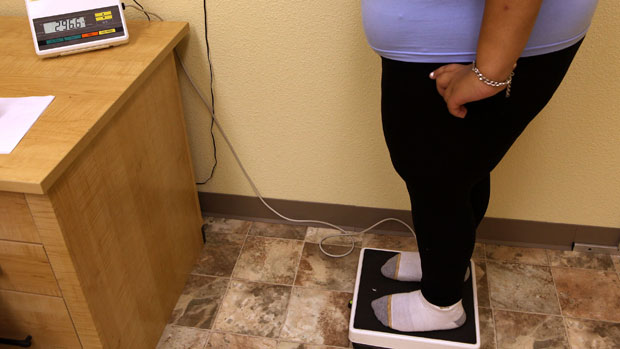GPs should stop worrying about offending obese patients, says study
Just a 30-second chat about weight can have a major impact for overweight patients

A free daily email with the biggest news stories of the day – and the best features from TheWeek.com
You are now subscribed
Your newsletter sign-up was successful
Doctors should not worry about offending obese patients by bringing up their weight, health experts have advised – and a 30-second chat can have a major impact on a patient's future weight.
More than 130 GPs took part in a trial in which they were asked to start a conversation about weight with obese patients who were consulting them about another matter.
They were asked to inform patients that weight management programmes such as Slimming World or Rosemary Conley are available free on the NHS. Others were told to offer general advice on slimming.
The Week
Escape your echo chamber. Get the facts behind the news, plus analysis from multiple perspectives.

Sign up for The Week's Free Newsletters
From our morning news briefing to a weekly Good News Newsletter, get the best of The Week delivered directly to your inbox.
From our morning news briefing to a weekly Good News Newsletter, get the best of The Week delivered directly to your inbox.
Of patients offered a place on a slimming programme, 77 per cent said yes. Forty per cent went to all the sessions. After a year, the slimming programme group had lost an average of 2.43kg (5.3lbs).
The patients who were offered general advice also lost weight, though not as much – an average of 1.04kg (2.3lbs).
Prof Paul Aveyard, of the University of Oxford, who is also a practicing GP, said doctors don't normally discuss weight with patients unless that is the reason they have come to the surgery.
He told The Guardian: "We weigh people and that's it. Whereas with smoking, every time we see them, once a year, we have to tell them effective ways to stop smoking.
A free daily email with the biggest news stories of the day – and the best features from TheWeek.com
"GPs worry a lot about offending people. It is a very personal thing. Secondly, they do worry that the conversation will go on a long time and not actually lead anywhere."
According to Sky News, 81 per cent of participants across both groups said they found the intervention "appropriate and helpful".
Aveyard added: "Doctors can be concerned about offending their patients by discussing their weight, but evidence from this trial shows that they should be much less worried."
Health experts at World Cancer Research Fund and Public Health England hailed the study, with the latter body saying: "It's important that GPs talk to their overweight and obese patients about losing weight and help them to find further support, as many do already.
"An extra 30 seconds could make all the difference; it doesn't take long and can be raised in a supportive and sensitive manner."
-
 How the FCC’s ‘equal time’ rule works
How the FCC’s ‘equal time’ rule worksIn the Spotlight The law is at the heart of the Colbert-CBS conflict
-
 What is the endgame in the DHS shutdown?
What is the endgame in the DHS shutdown?Today’s Big Question Democrats want to rein in ICE’s immigration crackdown
-
 ‘Poor time management isn’t just an inconvenience’
‘Poor time management isn’t just an inconvenience’Instant Opinion Opinion, comment and editorials of the day
-
 A real head scratcher: how scabies returned to the UK
A real head scratcher: how scabies returned to the UKThe Explainer The ‘Victorian-era’ condition is on the rise in the UK, and experts aren’t sure why
-
 How dangerous is the ‘K’ strain super-flu?
How dangerous is the ‘K’ strain super-flu?The Explainer Surge in cases of new variant H3N2 flu in UK and around the world
-
 Obesity drugs: Will Trump’s plan lower costs?
Obesity drugs: Will Trump’s plan lower costs?Feature Even $149 a month, the advertised price for a starting dose of a still-in-development GLP-1 pill on TrumpRx, will be too big a burden for the many Americans ‘struggling to afford groceries’
-
 The ‘menopause gold rush’
The ‘menopause gold rush’Under the Radar Women vulnerable to misinformation and marketing of ‘unregulated’ products
-
 The battle of the weight-loss drugs
The battle of the weight-loss drugsTalking Point Can Novo Nordisk and Eli Lilly regain their former stock market glory? A lot is riding on next year's pills
-
 Food may contribute more to obesity than exercise
Food may contribute more to obesity than exerciseUnder the radar The devil's in the diet
-
 How the care industry came to rely on migrant workers
How the care industry came to rely on migrant workersThe Explainer Government crackdown on recruiting workers abroad risks deepening care sector crisis, industry leaders warn
-
 Could medics' misgivings spell the end of the assisted dying bill?
Could medics' misgivings spell the end of the assisted dying bill?Today's Big Question The Royal College of Psychiatrists has identified 'serious concerns' with the landmark bill – and MPs are taking notice